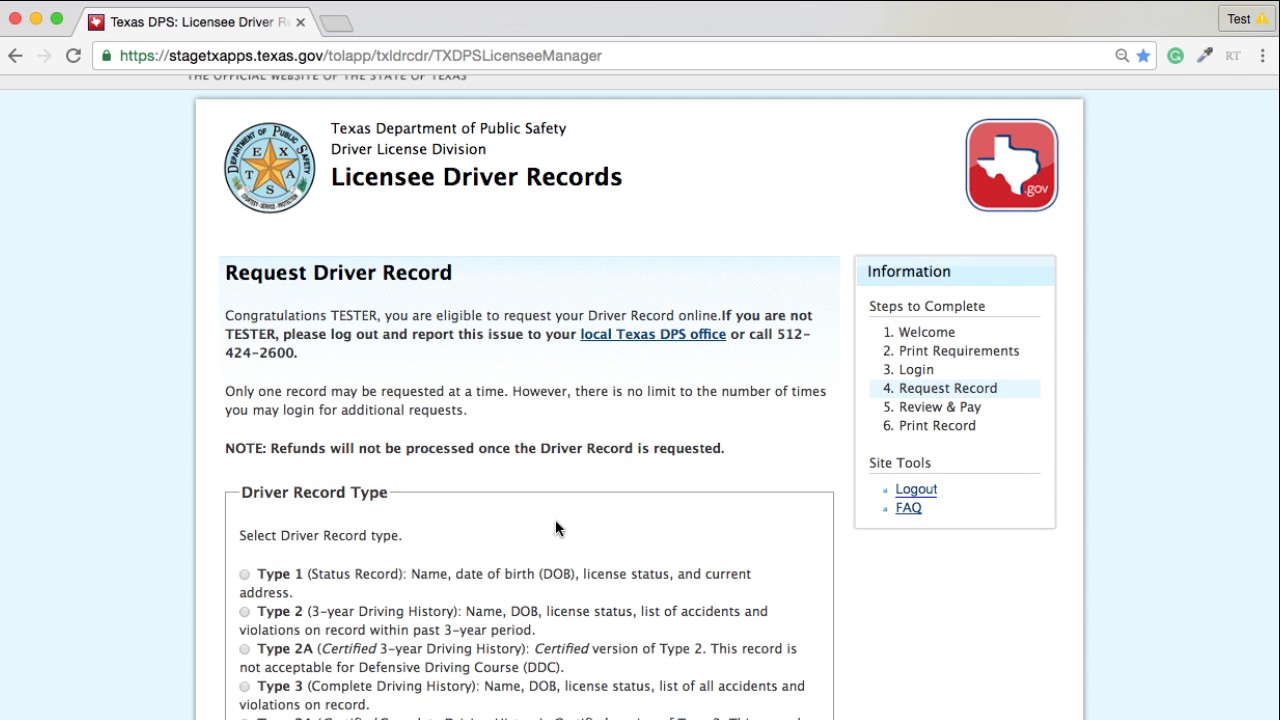
Whether you need a Texas driving record for court, employment, or to complete a defensive driving course, this comprehensive guide covers everything you need to know. From the six types of records available through Texas DPS to step-by-step ordering instructions, you’ll be fully informed and prepared to obtain the correct record for your needs.
By the end of this article, you’ll have a clear understanding of which record type to order, how much it costs, and how to obtain it efficiently through official channels. This knowledge will empower you to manage your driving record effectively and meet your specific needs.
A Texas driving record, also known as a motor vehicle record (MVR), is an official document from the Texas Department of Public Safety (DPS) that contains your complete driving history within the state. This certified record includes personal information, license details, traffic violations, accidents, points, and any license suspensions or restrictions.
Unlike criminal background checks or credit reports, your driving record focuses specifically on driving-related incidents and traffic law compliance. The record serves as an official verification of your driving history and is often required for court proceedings, employment background checks, insurance premium assessments, and submissions for defensive driving courses.
Texas DPS maintains these records as part of public safety oversight, ensuring that driver information is accurate and accessible when needed for legal or administrative purposes.

Texas DPS offers six different types of driving records, each designed for specific purposes and containing varying levels of detail:
The Type 3A record is the most commonly requested for defensive driving purposes, as it provides courts with necessary violation history while protecting personal address information.
The fastest and most reliable method is ordering directly through the official Texas DPS website:
Required Information:
Payment: We accept credit or debit cards. Delivery: Immediate PDF download or mail delivery option. Processing: Available 24/7 with instant results for downloads
You can submit a written request with a completed DPS form; however, this method takes significantly longer and incurs mailing fees.
Why Choose Official DPS: While third-party websites may offer driving records, ordering directly from Texas DPS ensures accuracy, official certification, and the lowest cost without additional service fees.
Your Texas driving record contains several key sections:
This information directly affects insurance premiums, employment opportunities, and eligibility for license renewal. Insurance companies use a driver’s violation history to assess risk and set rates, while employers may evaluate driving safety for positions that require vehicle operation.
The most common reason people request Type 3A records is to document completion of a defensive driving course. Texas courts often allow drivers to dismiss traffic tickets by completing an approved course, which requires submitting their driving record to verify eligibility.
Many employers require driving records for positions involving:
Insurance companies may request records to:
Regularly checking your record helps you:
Students in driver education courses or those obtaining a Texas driver’s license may need records for program completion or to upgrade their license.
Maintaining a clean driving record requires consistent safe driving practices and awareness of Texas traffic laws:
Keep your vehicle in good condition to avoid citations for:
Taking a Texas defensive driving course offers multiple benefits:
Virtual Drive of Texas offers state-approved defensive driving courses that meet all Texas court requirements and can be completed entirely online for maximum convenience.
Texas uses a point system where violations add points to your record:
Regular monitoring helps you stay aware of your point total and take action before reaching suspension thresholds.
Q: How often should I check my driving record? A: Review your record annually or before insurance renewals to ensure accuracy and monitor your status.
Q: Can I dispute incorrect information on my record? A: Yes, contact the Texas DPS directly to report errors and request corrections, providing supporting documentation.
Q: How long do violations stay on my record? A: Most violations remain visible for 3 years, though some serious offenses may remain visible longer.
Q: Do out-of-state violations appear on my Texas record? A: Texas participates in interstate reporting, so violations from other states typically appear on your record.
Q: Can employers access my driving record without permission? A: Employers must obtain your consent before requesting your driving record for background check purposes.
Understanding Texas driving records empowers you to make informed decisions about your driving history and requirements. Whether you need a record for court, employment, or personal monitoring, following the proper process through official Texas DPS channels ensures you receive accurate, certified documentation efficiently.
Maintaining a clean driving record benefits your insurance rates, employment opportunities, and overall driving privileges. Regular monitoring combined with safe driving practices and defensive driving education helps protect your record and enhances your skills behind the wheel.
Ready to improve your driving record? Enroll in our Texas Defensive Driving Course for just $25 and start the process of removing points while earning insurance discounts. For new drivers, explore our comprehensive Texas Driver’s License Guide to ensure you meet all state requirements.
more insights

Adult Drivers
Last Updated: July 16, 2025

CDL Training
Last Updated: July 16, 2025

Defensive Driving
Last Updated: July 16, 2025

Driver Wellness and Health
Last Updated: July 14, 2025

Drivers Ed
Last Updated: July 16, 2025

Driving Laws and Regulations
Last Updated: July 14, 2025

Driving Safety
Last Updated: July 16, 2025

Industry News and Updates
Last Updated: July 14, 2025
